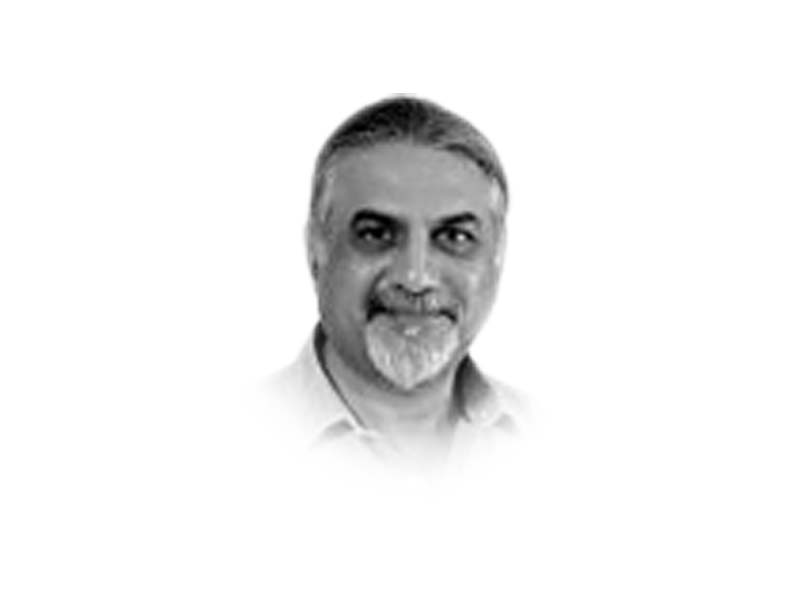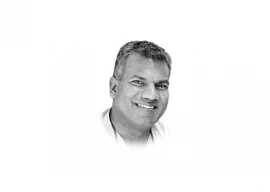
Three extraordinary events have taken place within the last week. The death (murder) of Arshad Sharif, the announcement of the date of much-awaited long march by Imran Khan and the appearance of DG ISI in the ISPR briefing. Arshad’s murder is the death of civic nationalism or what remains of it in this country. His death is the symbolic representation of what I consider the rebirth of civic nationalism in Pakistan and one of the reasons why the long march is being undertaken in this country. Arshad was a research journalist who was very passionate about his work and was a very brave man, but we all know this.
What we don’t know or are unwilling to know is that it is history that stiches the nation and the state together — not any history but true history. No matter how bitter its foundations, if it is not based on truth, we will never stitch ourselves together as a nation state. What was Arshad doing? He was trying to be true; he was objective in what he was doing, gathering information and data that was exposing the colonists’ leftover and their sponsors in our country. He was standing up for what we all want to be — sovereigns and a sovereign state that would not be dictated but would take all decisions basing on the core interests of this country; and that we should self-govern and be governed by the true representatives of the people and not by colonists-imposed regime of crooks and criminals.
What was the price that he had to pay for bringing about such exposures — he paid the grand price of his life. He represented truth and was a son of the soil who was rewriting the history based on his true findings. Before going on to the other two events — the long march and DG ISI’s presence in the DG ISPR’s brief — let me share with the readers the recent statement that has come from across the border from our arch rival and the greatest source of external threat, India. Indian Defense Minister Rajnath Singh has said, “India will achieve its goals when it reaches Gilgit-Baltistan.” He has accused us of committing “atrocities against the people of Azad Kashmir” warning of “consequences for our treatment”. Rajnath’s language is similar to the language that the Indian leadership spoke during the East Pakistan debacle. Like many Pakistanis, for me this is not a surprise.
What is surprising is why Pakistan has not been able to produce a civil leadership that can speak in the same language to the Indians. Why couldn’t we have even one defense minister who could ever speak so boldly and to whom people were ready to listen and believe? Credibility is when both the internal and external audiences are prepared to listen to you. The Supreme Court of Pakistan while hearing the petition on preventing Imran Khan’s long march commented: “The court does not want to use its pen as a stick.” In this refreshing comment, the top court was very objectively re-emphasising the true concept of separation of powers embedded in the Constitution. The role of transformation of a society is a role that the politics of a country must play and there is no doubt in my mind that Pakistan today is going through a transformational period.
People in Pakistan no more want hereditary, nepotism-based dynastic and aristocratic politics; they are striving for meritocratic politics which can produce defense ministers that can speak credibly in the same language to the Indians in which they speak to us. For that, such ministers need to come from a government that is formed on the aspirations of the people. What has Imran Khan been asking since being ousted from power six months back? He is asking for immediate elections to be held in this country so that a people-represented government can be formed — not his government but the government that is elected by the people and not imposed on them. Pakistan has witnessed the height of nepotism where families and friends have been favoured in the past and who have made huge fortunes not because they had an understanding of what were Pakistan’s core interests and how they could further those interests but only because they felt entitled to such a privilege.
For a very long time our establishment has embarked on a role which it considered as its entitlement. Nobody questions its power, but its role and purpose. The DG ISPR’s briefing in which the DG ISI made an appearance could have been avoided. Matters that were objective — such as the sidelining of Arshad from what he was doing, the many FIRs registered against him that forced him to run away from the country, and the fact that a government of crooks — never came under discussion. The real question is not why the establishment has become neutral or apolitical, but the critical time it has chosen to be so. It is the end of imperial entitlements that the people want. All our strategic assessments grow out of our history. Unfortunately, that is bitter and has left us to become who we are — a nation with dysfunctional government which is under huge debt.
This country cannot afford a strategic rivalry between its people and institutions. The only way forward is to give up on this and embrace the concept of co-existence. With the advent of the long march, Pakistan’s renewed history is in the making. Grasping the scholarly, philosophical implications of any given political problem is not the job of the men in uniform. That job rests with the true representatives of the people — the politicians. There is a lesson for all of us in the Stoic philosopher Epictetus who wrote: “We cannot choose our external circumstances, but we can always choose how we respond to them.” It’s time for our institutions to side by people’s choice because in the end it is what people value and their aspirations that act as the great driver in changing the course of history. I hope sanity prevails and a date for holding fresh elections in the country is announced — that is the only suitable way to fix the problem at hand.


1728301419-0/jlo-diddy-(1)1728301419-0-165x106.webp)


1728298226-0/BeFunky-collage-(31)1728298226-0-165x106.webp)








COMMENTS (1)
Comments are moderated and generally will be posted if they are on-topic and not abusive.
For more information, please see our Comments FAQ